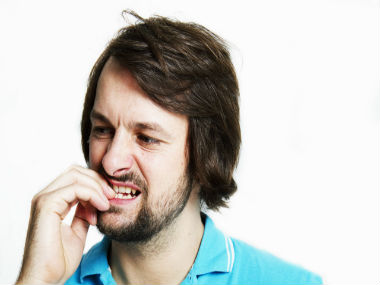If you haven’t been able to shake that childhood habit of biting your nails or picking on your skin, you’re not alone. Nail-biting or onychophagia is a medically documented condition that affects 12.7% of Indian children - with a higher prevalence among girls. According to one estimate, 2% of people seeking help at outpatient dermatology clinics in India have a skin-picking disorder or excoriation. Nail-biting and skin-picking — along with hair-pulling, eating hair and perpetual nose-picking — are types of body-focused repetitive behaviour disorder (BFRB) that have recourse in medicine. [caption id=“attachment_7472251” align=“alignleft” width=“380”]  Representational image. Image source: Getty Images.[/caption]
What is BFRB?
Often, we ignore BFRBs as just bad habits which will go away on their own or won’t cause serious harm. But these bad habits are medical conditions that can be controlled with treatment. “‘Body-focused repetitive behaviour’ disorder is characterized by difficulty or inability to resist the urge or impulse to perform certain behaviours that cause a degree of relief. The behaviour is perceived as a pleasant state; thus, it is negatively reinforced and tends to persist,” explained Archana Singal and Deepashree Daulatabad in “Nail tic disorders: Manifestations, pathogenesis and management”, published in the Indian Journal of Dermatology, Venereology and Leprology.
Five common BFRBs
There’s a fine line between a bad habit and a BFRB and a BFRB and an obsessive-compulsive disorder (OCD). Nail-biting, for example, can become obsessive. Here are five of the most common BFRBs:
- Onychophagia: Also known as nail-biting, onychophagia mostly develops in childhood. It is not unusual to have one or two people in our circle who have this condition and bite their nails all the time. In fact, 20-30% of the general population bite their nails so badly that they end up damaging their nails and the skin around them permanently.
- Excoriation: The habit of regularly touching, rubbing, scratching, picking or digging at your skin so much that it results in damage to the tissue or discolouration or scarring of the skin, excoriation is also known as dermatillomania.
People sometimes absent-mindedly touch their skin or pick the cuticles, acne or scabs - this is not a problem if it’s a one-off occurrence. But research shows that 2-5% of the population play with their skin so much that they end up damaging their skin tissues - sometimes to the extent that it affects their regular functioning. This disorder normally begins in early adolescence. Women are more affected by this disorder than men.
- Rinotillmania: Picking or digging the nose is so common that while answering a questionnaire for a study in 1995, 91% of people accepted that they do it regularly. Around 75% thought that it was very common and that everyone does it.
While some pick their nose out of boredom, others do it because of nervousness. Still others because of allergies or sinus infections. People who live with this BFRB are also likely to have another BFRB.
- Trichotillmania: Trichotillmania is a BFRB in which a person constantly pulls hair from their scalp, eyelashes, eyebrows, hands or legs or even from the pubic area to such an extent that it causes substantial hair-loss. Boredom, anxiety or distress are the common causes of this problem. Like the other BFRBs, trichotillomania typically starts in early adolescence. But if it is not treated, it can become a lifelong condition.
- Trichophagia: It is common for people with trichotillomania to nibble on their hair or hair roots as well. They can do this with other people’s hair, too. Like the other BFRBs, trichophagia is often triggered by stress. Most trichophagia patients accept that nibbling hair helps them to feel relaxed for some time.
Common in OCD patients, trichophagia can be life-threatening - the swallowed hair can form a ball inside the stomach, which has to be removed surgically.
Take Medical Help
Don’t ignore BFRBs as bad habits. Talk to your doctor, and take the required medical help to save yourself from the social-embarrassment and the physical damage. Since most BFRBs are stress and anxiety borne, cognitive behavioural therapy (CBT) is the most effective treatment for BFRBs. Singal and Daulatabad write in their article that a high dose of Fluoxetine may help grown-ups who compulsively bite or chew their nails. Ask your doctor before you try any therapy or drug. Health articles in Firstpost are written by myUpchar.com, India’s first and biggest resource for verified medical information. At myUpchar, researchers and journalists work with doctors to bring you information on all things health. For information on obsessive-compulsive disorder, please read our article here_._


)

)
)
)
)
)
)
)
)



